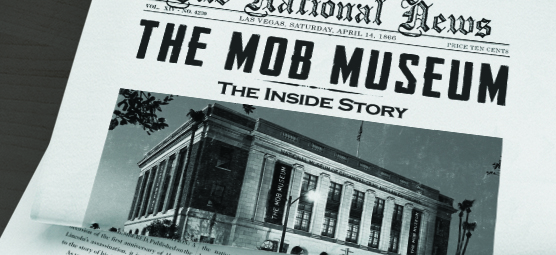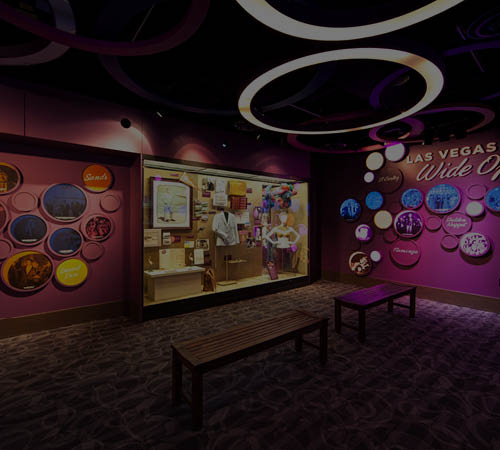Did the Chicago Mob send Jack Ruby to Dallas?

Gerald Posner, the Pulitzer Prize-nominated author of Case Closed: Lee Harvey Oswald and the Assassination of JFK, will defend the lone shooter theory as part of a panel discussion at The Mob Museum’s JFK: An Inside Look into the Assassination of a President 50 Years Later, set for 7 p.m. Thursday, November 7, in the Museum.
Tickets for the event are $30 for non-members; Museum members will receive a 10 percent discount.
To reserve a spot, click here
Jack Ruby was honorably discharged from the army on February 21, 1946, and returned home to Chicago. But he stayed there for just another year and a half, becoming a partner in Earl Products, a company started by his brothers. Once again, Jack was selling punchboards, key chains, bottle openers, light tools and salt and pepper shakers. But he quarreled with his brothers, and they eventually bought out his share for $14,000. He then decided to follow his sister Eva to Dallas. She had gone there in 1947 and, with money borrowed from her brothers, opened the Singapore Supper Club, which she ran as a nightclub. When Jack moved to Dallas by late 1947, he helped her manage that club.
Was Ruby brought to Dallas by the Chicago Mafia in order to run its operations in Texas?
Paul Roland Jones, who represented a group of Chicago criminals, had tried to bribe the Dallas sheriff, Steve Guthrie, in 1946. Guthrie later claimed that Ruby’s name had come up in conversations with Jones a number of times. However, a Dallas policeman present during some of the conversations contradicted Guthrie’s account and said he never heard Ruby’s name mentioned. Ruby is not referred to in 22 of the surveillance recordings still available, and Jones described the man he intended to bring to Dallas as someone who looks like a “preacher, not a dago, not a Jew.”
Bill Alexander, the assistant district attorney who knew Ruby and later successfully prosecuted him for killing Oswald, told the author: “There is no way the Chicago Mob would have allowed Ruby to be their representative in Dallas. Just no way. He was not the type of person they would trust with their business.”
Bill Roemer, the FBI agent who investigated the Mafia in Chicago, agreed and also told the author, “Ruby was absolutely nothing in terms of the Chicago Mob. We had thousands and thousands of hours of tape recordings of the top Mobsters in Chicago, including Sam Giancana (the city’s godfather), and Ruby just didn’t exist as far as they were concerned. We talked to every hoodlum in Chicago after the assassination, and some of the top guys in the Mob, my informants. I had close relationships with them—they didn’t even know who Ruby was. He was not a front for them in Dallas.”
On December 30, 1947, he legally changed his name to Jack Leon Ruby. During the next 16 years in Dallas, he had stakes in six nightclubs, losing money in each, until he finally managed to turn a small profit at his last one, the Carousel, a
strip club. In 1952, however, his financial woes were so great that he had a mental breakdown and had to recuperate for several months. He spoke alternately of killing one of his partners or ending his own life. For a while he thought of returning to
Chicago, but decided finally to remain in Dallas. His money problems stayed with him and, by the mid-1950s, Ruby had an excise-tax delinquency with the Federal government and had to borrow $5,500 from his brother Sam to pay the debt.
Besides his nightclubs, he tried other businesses, ranging from selling sewing machine attachments to costume jewelry. He became the manager for a young black entertainer dubbed “Little Daddy Nelson” and spent whatever money he had promoting the act. At various times, he sold pizza crusts to Dallas restaurants,anti-arthritis preparations, twistboards, liquid vitamins and English steel razor blades. He provided entertainment to Dallas hotels, promoted music records, tried to build and sell log cabins at a Texas lake resort, and even looked into selling jeeps to Cuba. All his business ventures were unsuccessful.
“Jack was always in some kind of debt,” says Earl, one of his brothers. “He always was owing some money to the government on taxes. By the time he was arrested for shooting Oswald, he owed me over $16,000. He always had some business idea in the works, some new project he had hatched, but just never seemed to make any money at any of them.”
Ruby, anxious to be accepted in Dallas, was frustrated by his repeated business failures. Tony Zoppi was a prominent entertainment reporter for the Dallas Morning News and knew Ruby well. “He was a born loser, a real low-level loser,” says Zoppi. “He didn’t have 20 cents to his name. I knew dozens of guys like him back in New Jersey and in New York. They were fellows always trying to make a name for themselves, always hustling something. He was a hanger-on who was very impressed by famous people, impressed by ‘class,’ and with anybody that he thought had it. He used to call me up and say, ‘Hey, Tony, I run a real classy joint, class all the way, huh? Don’t I have class?’ But the people that knew him knew that Ruby was a zero. He used to give out passes for his club to everyone he met. He would announce: ‘Hi, I’m Jack Ruby,’ like it was supposed to mean something. People used to say to me, ‘How can you tolerate that guy?’”
“He would do anything to attract attention to himself,” said Janet Conforto, his star dancer, also known as Jada. “He craved attention. He really wanted to be somebody, but didn’t have it in him. He hung around police headquarters. He was a nuisance around newspaper offices. He knew a tremendous number of people in Dallas, but he didn’t have many friends. Oh, he wanted friends, but he didn’t have the capacity to make and hold them. He was insecure . . .and often remarked, ‘I’m a character! I’m colorful.’”
Bill Willis, a drummer at the Carousel, remembered that Ruby tried to impress people by using large words in his conversations: ”They always came out wrong,” recalled Willis. ”He’d say things like, ‘It’s been a lovely precarious evening.’ Or he’d tell a girl, ‘You make me feel very irascible.’”
”He tried too hard to be accepted,” says district attorney Alexander. ”He had several strikes against him in Dallas. He was a nightclub owner, a Yankee, and a Jew. And no matter how hard he tried—and he did try hard to have people like him—he just wasn’t going to get very far in Dallas. He was just a little guy trying to make it here.”
@copyright Gerald Posner, 1993, 2013
Feedback or questions? Email blog@themobmuseum.org





